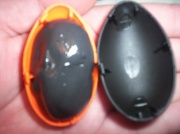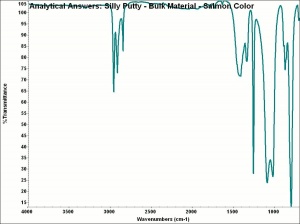Difference between revisions of "Silly Putty"
Jump to navigation
Jump to search
| Line 2: | Line 2: | ||
== Description == | == Description == | ||
| − | [Binney & Smith] A bouncing, rubbery polymer developed in 1943 by James Wright at General Electric. Silly Putty is made from [[silicone| | + | [Binney & Smith] A bouncing, rubbery polymer developed in 1943 by James Wright at General Electric. Silly Putty is made from [[silicone oil|silicone oil]] polymerized by the addition of [[boric_acid|boric acid]]. Peter Hodgson gave the bouncing rubber the name Silly Putty in 1950 when he introduced it at the International Toy Fair in New York. Binney & Smith purchased the rights to the product in 1971. To celebrate its 50th anniversary, Silly Putty was put on display in the Smithsonian Institution. |
== Synonyms and Related Terms == | == Synonyms and Related Terms == | ||
Revision as of 09:17, 31 May 2022
Description
[Binney & Smith] A bouncing, rubbery polymer developed in 1943 by James Wright at General Electric. Silly Putty is made from Silicone oil polymerized by the addition of Boric acid. Peter Hodgson gave the bouncing rubber the name Silly Putty in 1950 when he introduced it at the International Toy Fair in New York. Binney & Smith purchased the rights to the product in 1971. To celebrate its 50th anniversary, Silly Putty was put on display in the Smithsonian Institution.
Synonyms and Related Terms
Potty Putty (Br.); Tricky Putty
Risks
May leave silicone oil residue on contacted surfaces.
Resources and Citations
- Silly Putty: Website
- Thought Co. Chemistry and History of Silly Putty

